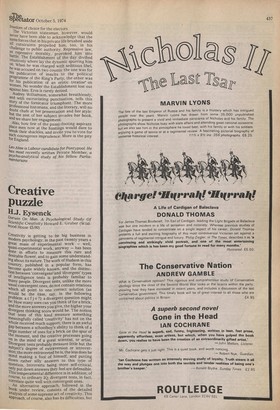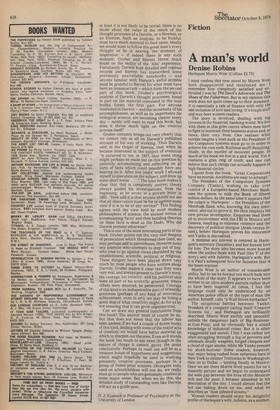Creative Puzzle
Eysenck
Darwin On Man, A Psychological Study Of Scientific Creativity Howard E. Gruber (WildWood House £.5.00)
Creativity is getting to be big business in rnodern psychology; in the past twenty years a great mass of experimental work — well, quasi-experimental work, anyway — has been done in efforts to measure this rare and desirable flower, and to gain some understanding about its nature. The work of Hudson in this country, published in a popular form, has become quite widely known, and the distinction between 'convergent' and 'divergent' types of intelligence tests is probably familiar to Many people. Divergent tests, unlike the more usual convergent ones, do not contain relations Which all point to one correct solution (as would be the Case, say, in the following Problem: a c fj o ?); a divergent question might be: How many uses can you think of for a brick, and the more answers you give, the higher your divergent thinking score would be. The notion that tests of this kind measure something meaningfully called 'creativity' has not on the Whole received much support; there is an awful gap between a schoolboy's ability to think of a large number of uses for a brick on the spur of the moment, and the creative processes going On in the mind of a great scientist, or artist. Oivergent tests probably measure little but the subject's degree of extraversion or introversion; the more extraverted he is, the less does he mind making a fool of himself, and putting clown rather silly answers to this type of question. Introverts being more self-critical, °n‘Y put down answers they feel are defensible_ This temperamental difference is in addition, of course, to ordinary IQ; divergent tests, in fact, correlate quite well with convergent ones. An alternative approach, followed in the book under review, consists of the detailed analysis of some supreme act of creativity. This approach, of course, also has its difficulties, but
at least it is not likely to be trivial; there is no doubt about the value of the result of the thought processes of a Darwin, or a Newton, or an Einstein. Such an analysis, to be fruitful, must have much material to feed upon: ideally we would want to follow the great man's every thought as he is nearing the moment of inspiration — if indeed there is any such moment; Gruber and Barrett throw much doubt on the reality of the 'Aha' experience. Fortunately Darwin kept detailed and copious records and Barrett has transcribed some previously unavailable notebooks — and anyone familiar with Darwin's awful scribble must be grateful to Barrett for what must have been an immense task — which form the second part of this book; Gruber's psychological analysis of Darwin's thought processes, based in part on the material contained in the note books, forms the first part. For anyone interested in Darwin — and the immensity of his accomplishment, as well as its importance for biological science, are becoming clearer every day — surely will want to read this book; but does it throw much light on the creative process itself?
Gruber certainly brings out very clearly that we cannot rely at all on Darwin's published account of his way of working. Thus Darwin said, in the Origin of Species, that when he became interested in the subject of evolution "it occurred to me, in 1837, that some thing might perhaps be made out on this question by patiently accumulating and reflecting on all sorts of facts which could possibly have any bearing on it. After five years' work I allowed myself to speculate on the subject, and drew up some short notes . . ." The note book makes it clear that this is completely untrue; theory always guided his investigations, from the beginning; as he wrote in a private letter in 1861: "How odd it is that anyone should not see that all observation must be for or against some view if it is to be of any service!" This finding agrees with the view held by most modern philosophers of science; the ancient notion of accumulating 'facts' and then building theories on these facts is dead as the Dodo. Why did Darwin pretend otherwise?
This is one of the most interesting parts of the book. Gruber points out the very real dangers of persecution which threatened then (and, we may perhaps add in parentheses, threaten now) any scientist who attempts to step out of line, who tries to go against views cherished by the establishment, scientific, political, or religious. These dangers have been played down very much by most people who have written about Darwin; Gruber makes it clear that they were very real, and always present to Darwin's mind. His courage; his tenacity, and his political skill were all part of his scientific greatness; where others were deterred, he persevered. Courage of this kind is an indispensable part of scientific greatness (perhaps of any kind of innovative achievement, even in art); we may be losing a great deal of what creativity might do for us by not ensuring that it can grow unpersecuted.
Can we draw any general conclusions from this book? The answer must of course be no. But that does not mean that the labour has been useless; if we had a couple of dozen books of this kind, dealing with some of the major acts of creation; we would have better material on which to sharpen our theories. Even as it stands the book has much to say even though in the nature of things it cannot prove the point conclusively. Perhaps its main use will be as a treasure house of hypotheses and suggestions which might hopefully be' used in studying genuinely creative processes, perhaps in a group of Nobel prize winners. Divergent tests used on schoolchildren will not do; we really must go to people who are genuinely creative in some major sense. But when we do this, the detailed study of outstanding men like Darwin will act as a guide-post, H. J. Eysenck is Professor of Psychiatry at the University of London

































 Previous page
Previous page